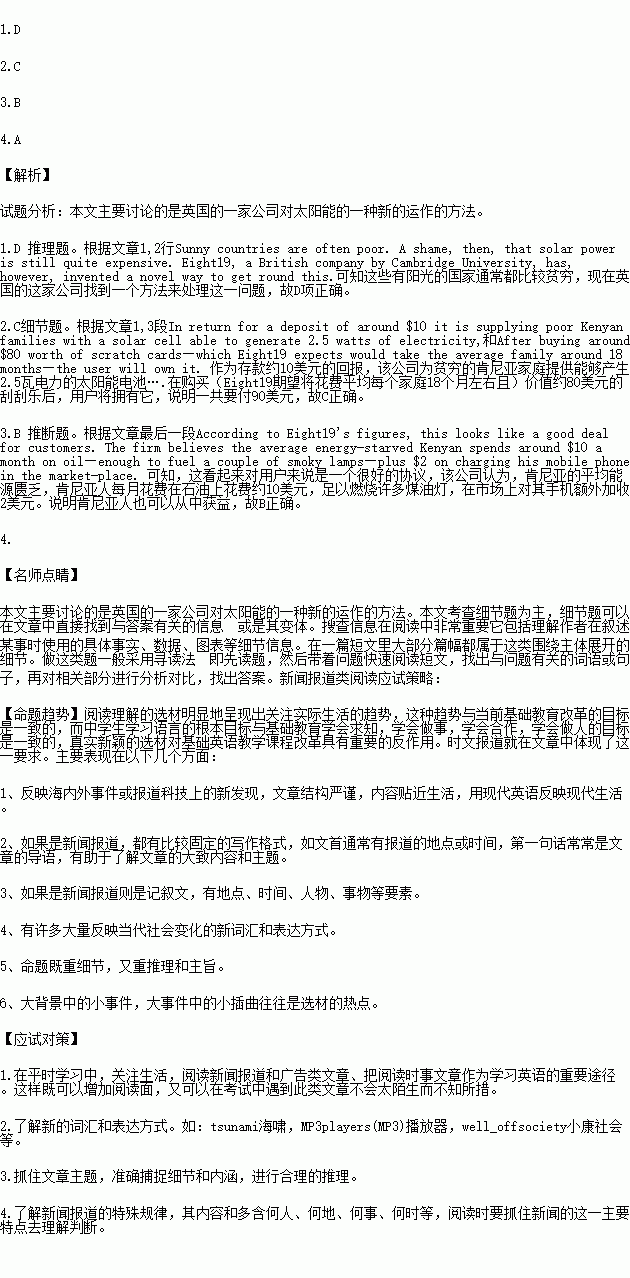题目内容
阅读下列短文,从每题所给的四个选项(A、B、C和D)中,选出最佳选项。
Sunny countries are often poor. A shame, then, that solar power is still quite expensive. Eight19, a British company by Cambridge University, has, however, invented a novel way to get round this. In return for a deposit of around $10 it is supplying poor Kenyan families with a solar cell able to generate 2.5 watts of electricity, a battery that can deliver a three amp(安培) current to store this electricity, and a lamp whose bulb is a light-emitting diode(二极管). The firm thinks that this system, once the battery is fully charged, is enough to light two small rooms and to power a mobile-phone charger for seven hours. Then, next day, it can be put outside and charged back up again.
The trick is that, to be able to use the electricity, the system's keeper must buy a scratch card—for as little as a dollar—on which is printed a reference number. The keeper sends this reference, plus the serial number of the household solar unit, by SMS to Eight19. The company's server will respond automatically with an access code to the unit.
Users may consider that they are paying an hourly rate for their electricity. In fact, they are paying off the cost of the unit. After buying around $80 worth of scratch cards—which Eight19 expects would take the average family around 18 months—the user will own it. He will then have the option of continuing to use it for nothing, or of trading it in for a bigger one, perhaps driven by a 10-watt solar cell.
In that case, he would go then through the same process again, paying off the additional cost of the upgraded kit at a slightly higher rate. Users would therefore increase their electricity supply steadily and afford ably.
According to Eight19's figures, this looks like a good deal for customers. The firm believes the average energy-starved Kenyan spends around $10 a month on oil—enough to fuel a couple of smoky lamps—plus $2 on charging his mobile phone in the market-place. Regular users of one of Eight19's basic solar units will spend around half that, before owning it completely. Meanwhile, as the cost of solar technology falls, it should get even cheaper.
1.The underlined word “get round” in the first paragraph can be replaced by _______ .
A. make use of B. come up with
C. look into D. deal with
2.How much would users pay for the cell and scratch cards before they own a 2.5-watt solar cell?
A. Around $10. B. Around $80.
C. Around $90. D. Around $180.
3.It can be inferred from the last paragraph that ____________.
A. Kenyan families would find it difficult to afford the solar cell
B. using the solar cell would help Kenyan families save money
C. few Kenyan families use mobile phones for lack of electricity
D. the company will make a great profit from selling solar cells
4.What might be the most suitable title for the passage?
A. Solar Energy: Starting from Scratch.
B. Eight19: a creative British Company.
C. Kenyan Families: Using Solar Energy for Free.
D. Poor Countries: Beginning to Use Solar Energy.


